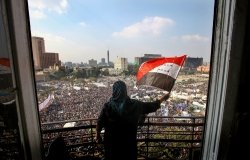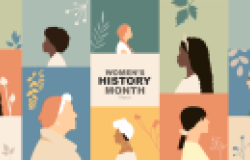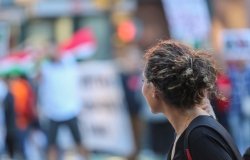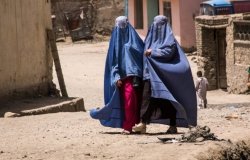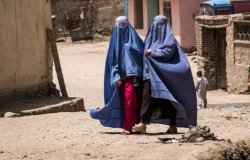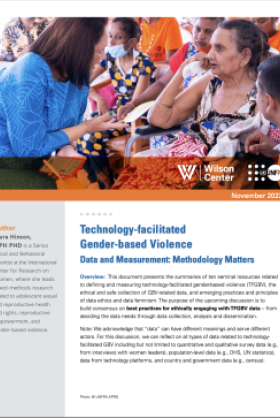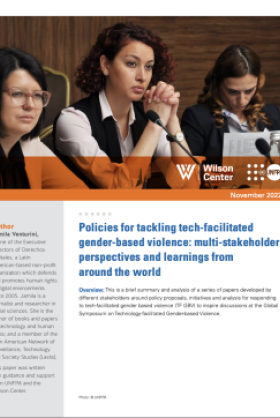Women Challenge the Muslim Brotherhood
Responding to the Muslim Brotherhood, leading female activists are charging that Islam actually guarantees women wide-ranging rights–and that the largest Islamist movement in the Arab world merely wants to maintain male dominance. In March, the Brotherhood had warned that U.N. passage of a draft declaration on violence would lead to society’s “complete disintegration.” It said that the declaration contradicted Islamic principles by allowing women to have full sexual freedom and marry outside their faith while cancelling the need for a husband’s consent to “travel, work, or use of contraception.”
Responding to the Muslim Brotherhood, leading female activists are charging that Islam actually guarantees women wide-ranging rights–and that the largest Islamist movement in the Arab world merely wants to maintain male dominance. In March, the Brotherhood had warned that U.N. passage of a draft declaration on violence would lead to society’s “complete disintegration.” It said that the declaration contradicted Islamic principles by allowing women to have full sexual freedom and marry outside their faith while cancelling the need for a husband’s consent to “travel, work, or use of contraception.” The nine female activists come from Egypt, Jordan, Iraq and Morocco.
Egypt Reham Afifi, Projects Manager of Free Egyptian Women's Speak Up Group
The Muslim Brotherhood has long had a desire to curtail rights that Islam actually guarantees women. The Brotherhood is tightening its grip on society by posing as the guardian of Sharia, or Islamic law― taking advantage of society’s lack of knowledge of Islamic jurisprudence on women’s rights. The movement defends its interpretation of Islam with flimsy arguments whenever women’s rights are brought up. The Brotherhood's statement is full of slanderous allegations meant to garner public opinion. It sullied Egypt’s reputation and the world’s image of Islam.
Howaida Nagy, Grant Coordinator at CARE International
The U.N. statement on the status of women expands the definition of violence to include lack of health services, denial of education and withholding of employment opportunities. But the Muslim Brotherhood’s statement deals with issues that are irrelevant to the document, such as divorce, inheritance, polygamy and dowry.
The movement might have denounced the U.N. draft declaration to push Egypt to eventually withdraw from the U.N. Committee on the Elimination of Discrimination Against Women and the U.N. Convention on the Rights of the Child. Egypt’s new constitution does not reference commitments to international conventions.
Magda el Nweish, Chairwoman of Arab Women for Development
Unfortunately the Muslim Brotherhood’s statement was false. It did not reflect the reality of women’s status mentioned in the U.N. declaration or account for the political awareness of the Egyptian street.
Morocco Hasnaa Chehabi, Chair of the Women, Water and Environment Society
Unfortunately the Muslim Brotherhood condemned the U.N. draft declaration, which promotes dignity and freedom for women. The movement’s reaction was ignorant and contradicted the principles of Islam.
Religious values are important, but they develop according to the time and place. Islamic law was formulated centuries ago and is seldom totally in line with the age of globalization and the Internet. The Brotherhood should learn to separate religion from politics and power. Secular Turkey succeeded in separating the two and it became a developed country.
Jordan Wafaa Bani Mustafa, Member of Parliament
The draft U.N. declaration focused on violence against women, mechanisms to curtail it, and ways to help victims. But the Brotherhood’s statement touched on several contentious issues not addressed by the declaration. This detracted from the central issue, namely violence against women. But many Muslim countries have agreed with the U.N. draft.
Iraq Suzan Aref, Director of Women’s Empowerment Organization (Kurdistan Region)
The Muslim Brotherhood’s objection is about saving the dominant power of men over women and society in general ― in the name of religion. Religion is about fairness, justice and reform. It is not about implementing the law of the jungle. Religion does not entail slavery and vice. The Brotherhood is imposing restrictions on women’s freedom and dignity by deceiving society in the name of religion. Depriving women of their own rights to education and work because of so-called “honor” and humiliating them for earning their own way is not acceptable.
Ghada al Amely, General Director of al Mada for Art Media and Culture
The Muslim Brotherhood is having a difficult time dealing with issues of democracy, women’s rights, Coptic (Christian) rights, and how to maintain a healthy relationship with the West. In the next stage, the movement could even seek to abrogate women’s right to run for office, or prevent them voting under the pretext of maintaining female circumcision. A move like this would undermine support for the Brotherhood and isolate it from mainstream society.
Buthainah Mahmoud Abbas, Chief of Hawa'a Organization for Relief and Development
The Brotherhood and many other Islamic movements reject calls for women’s emancipation. They see the expansion of freedom for women in their communities as degradation.
Hana’a Hamood Abbas, President of Rafidain Women’s Coalition
There is a general lack of understanding and agreement on what constitutes violence against women. Even the title of the U.N. declaration alone, might be a sensitive issue for some. But Muslims can accept what is consistent with Islamic law ― which forbids violence against women.
Click here for the Muslim Brotherhood’s full statement.
Related Program

The Islamists
Learn more about Hamas and how it relates to similarly aligned organizations throughout the region. Read more
